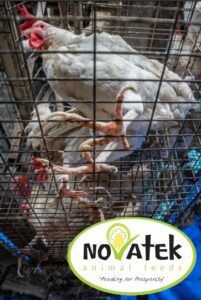Heat stress management in monogastric species
Heat stress is a critical concern in the management of monogastric species, including poultry, swine, and rabbits. Monogastric animals are highly sensitive to environmental temperature fluctuations, making it essential to implement effective heat stress management strategies. Let us take a moment to explore the causes and consequences of heat stress in monogastric species and discusses various management techniques to mitigate its impact.
Causes of heat stress
Monogastric species are homeothermic, which means they regulate their body temperature within a narrow range.
When ambient temperatures rise, they can experience heat stress due to the following factors:
High temperatures: Hot weather, especially during summer months, can elevate the environmental temperature beyond the comfort zone of monogastric animals.
Humidity: High humidity levels can impair the animals’ ability to dissipate heat through evaporative cooling, causing heat stress.
Poor ventilation: Inadequate ventilation systems in housing facilities can trap heat and humidity, further exacerbating the problem.
Consequences of heat stress
Heat stress can have severe consequences for monogastric species:
Reduced performance: Heatstressed animals often exhibit decreased feed intake, growth rate, and egg or meat production, leading to economic losses for producers.
Mortality: Extreme heat stress can be fatal, especially in poultry, where high temperatures can cause heat strokes and sudden death.
Health issues: Heat stress weakens the immune system, making animals more susceptible to diseases and increasing medication and treatment costs.
Heat stress management strategies
Environment control: Proper housing design and management are essential. Adequate ventilation, shade, and cooling systems can help maintain a comfortable environment for monogastric species.
Hydration: Providing clean, cool water is crucial during periods of heat stress to prevent dehydration. Hydrated animals are better equipped to regulate their body temperature.
Nutritional adjustments: Modify the animals’ diet to include electrolytes and feed additives that support thermoregulation. Reducing the energy density of the diet during hot weather can also help.
Reduce stocking density: Lowering the number of animals per unit of space can reduce heat stress as it minimises the heat produced by animal metabolism and provides more space for airflow.
Timing of activities: Adjust feeding and management practices to cooler times of the day, such as early morning or late evening, to minimise heat stress.
Shade and cooling systems: Provide shaded areas and install cooling systems like misting or evaporative cooling to lower ambient temperature within housing facilities.
Monitoring: Regularly monitor the animals’ behaviour, respiratory rate, and rectal temperature to identify signs of heat stress promptly. Early intervention is critical.
In conclusion, heat stress management in monogastric species is of paramount importance to ensure their well-being and productivity. Implementing a combination of environmental control, proper nutrition, and vigilant monitoring can help mitigate the adverse effects of heat stress. Proactive measures not only promote animal welfare but also contribute to the economic sustainability of monogastric farming operations, making it a critical aspect of modern animal agriculture.
Novatek is well known as Zambia’s leading stock feed producer and distributor. They pride themselves in supplying the best quality feed across the country. For information on Novatek’s wide range of products and quality feed, contact Robert Kanyembo, Novatek National Sales Manager on (+260) 97-125-2522.









